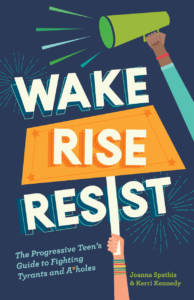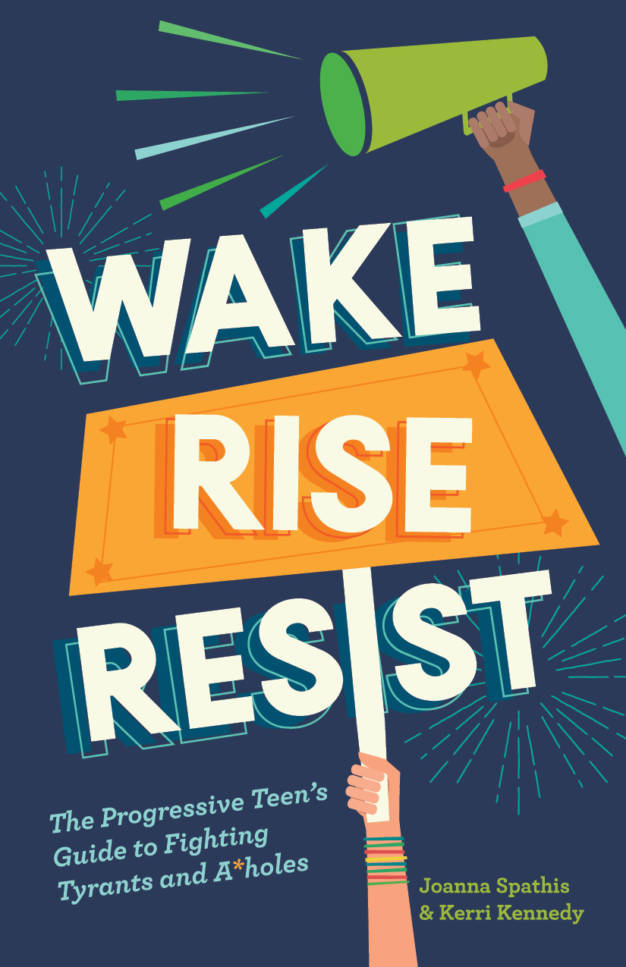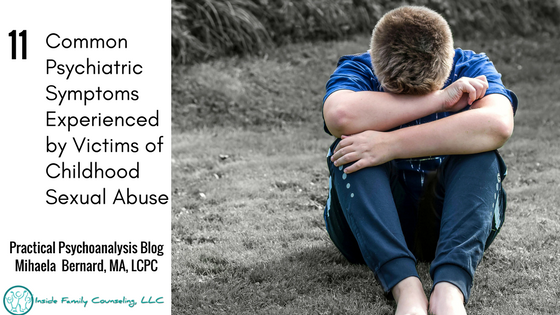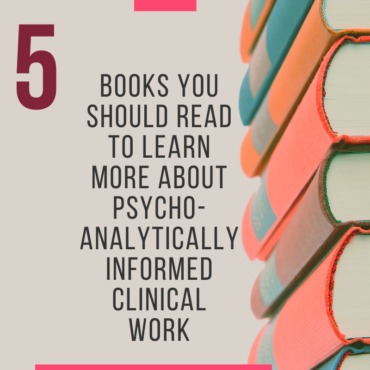I typically try to avoid bringing up controversial or political topics in my posts, partly to be inclusive and not to offend anyone. But as politics does impact people’s mental health and as two of my neighbors wrote a book about it, specifically targeting teens, I decided to break the silence on this issue. In this edition of Mental Health Digest, I share with you an example activist effort of two progressive writers and moms, and their contribution to the political conversation with our kids:
Guest Article by Kerri Kennedy, co-author of “Wake, Rise, Resist: The Progressive Teen’s Guide to Fighting Tyrants and A*holes”
A recent protest sign perfectly summed up the mental toll of last year. It read, “2017 was the longest decade of my life.” Long, indeed! No matter what part of the political spectrum you fall on (but particularly if you fall on the progressive side of politics), 2017 was a long, hard slog through frustration and worry.
 As the author of Wake, Rise, Resist: The Progressive Teen’s Guide to Fighting Tyrants and A*holes, the long-term effects of this political administration on the country’s population is something I’ve been struggling to process. In fact, I wrote the book because I so strongly believe that this country cannot afford to lose an entire generation to disgust-induced apathy.
As the author of Wake, Rise, Resist: The Progressive Teen’s Guide to Fighting Tyrants and A*holes, the long-term effects of this political administration on the country’s population is something I’ve been struggling to process. In fact, I wrote the book because I so strongly believe that this country cannot afford to lose an entire generation to disgust-induced apathy.
The good news is that there are many concrete, practical ideas to help people feel empowered and tuned in while not compromising their mental health:
#1 Fuel your growth mindset. The times they are a-changing … whether we’re ready or not. We are experiencing societal changes in how we deal with gender, with racism, with what it means to be American—and we are doing it all without the safety net of reasoned political leadership. If there is one action from my book that I hope people will embrace, it’s Action #55 Grow your growth mindset. A growth mindset requires an openness to updating old mental scripts. But with a twist in perspective, what once felt like a scary amount of change can become an exciting opportunity for growth. A growth mindset provides the mental space to become a powerful change agent for equality, justice, and progress.
#2 Learn to speak up! Once you have that growth mindset in place, you will start seeing this topsy-turvy world as one opportunity for growth after another. Staying quiet and keeping all of those ideas inside will seem impossible. To quote writer Arundhati Roy, “The trouble is that once you see it, you can’t unsee it. And once you’ve seen it, keeping quiet, saying nothing, becomes as political an act as speaking out.” But here’s the not-so-hidden secret about speaking up: it’s not just for extroverts! As we researched our book, we found ways for all personality types to contribute. For every talent, there is an opportunity: the tech person can volunteer to help with a website; the consensus-builder can become the glue that holds an organization together; the artsy activist can design a group’s fliers, postcards, and Instagram posts; and on and on and on and on. Just try shutting up after you realize how easy it is to “speak” up!
#3 Grow your understanding. We live in a country that is filled with people unlike us. What a glorious opportunity for growth! And yet—oh, the irony!—it can be hard to learn more about people who are different than ourselves. But in order to achieve progress, we must gain a better understanding of people unlike ourselves. Technology to the rescue! Two of my favorite actions let you learn about the world from the comfort of your laptop. Action #16 Listen your way to a better understanding uses the power of oral histories—taped interviews about the past with everyday people—to learn about other cultures. Check out Groundswell: Oral History for Social Change (www.oralhistoryforsocialchange.org) to easily find oral histories from diverse, often-overlooked communities. #20 Visit a museum … in your pajamas is a great reminder that a virtual world awaits with just a few clicks in the right places. Check out the digital offerings of museums such as the National Museum of African American History & Culture (nmaahc.si.edu) and the Arab American National Museum (www.arabamericanmuseum.org).
#4 Make connections. When your eyes pop open at 3 am and the worries about the world start mounting, it can feel like you are the only person in the universe. Add in the polarized nature of social media these days, and it’s easy to start feeling isolated. In the age of resistance, there is never a reason to be lonely. Remind yourself constantly that you are not alone. There are groups to join, meetings to attend, articles to read and discuss—all of which can be done online if you happen to live in an area where it’s hard to find people with your same concerns. Even going to a march solo isn’t a lonely experience; instead, it’s a great way to make dozens of new like-minded and similarly passionate friends. Authentic connections are invaluable these days and—as a bonus—provide you with built-in cheerleaders and sounding boards on hard days.
#5 Embrace your creativity. Art has long been a refuge in troubled times. Let these times be no different. You don’t have to be a Picasso to take up painting or drawing, and you don’t have to be an Alice Walker to start writing. Immerse yourself in something beautiful and creative and creative, and you’ll give your mind a rest from its seemingly endless worrying. And don’t feel limited to just painting or writing: Take up the guitar. Start making stop-motion movies with an app on your tablet. Learn how to weave textiles. Finally figure out what all of those filters are on your phone and begin experimenting with art photography. Find something, anything that gives you joy and presses that creative button inside you. And then if you want to take it an extra step, try Action #87 Curate for a cause and hold an art showcase to display your work. (Have attendees also create art at the event, and make it a fundraiser if you wish!) You could even make it a resistance-themed night, and challenge all of those new connections you made in #4 to join in.
#6 Show some love. It’s not a groundbreaking idea, but the practice of gratitude (Action #123 Practice gratitude) is especially powerful in hard times: giving thanks for what you have is like a mental vacation from worrying about what is going on in the world. What’s more, gratitude can help you feel more connected—a soothing balm when the world you once knew feels alienating. To bump up that feeling of connection, gather a group of friends to form a gratitude circle. Email or text each other your gratitude each day, and let each ping of a new message help you remember how very much good is in the world and how very important it is to continue the fight to keep that love and tolerance in the world.
#7 Spread the love. It is especially important to show yourself love and kindness during difficult times. Be sure to take time out each day (each hour in any especially trying time!) to practice self-care to renew and refresh yourself. Meditation (Action #124 Send out vibes) can be an especially powerful reset button. We are particularly partial to loving-kindness meditation, which allows you to show love to yourself and to the world around you—an empowering act when the world seems to be pressing in around you. Say the meditation—“May you be happy. May you be well. May you be safe. May you be peaceful and at ease.”—for yourself and for others, and flex your compassion muscles.
Our wish for you is that you find the ease in these turbulent times. It may take a bit of effort, but for that trouble, you will be rewarded with a richer, more compassionate, and more rounded life. May you be happy, dear reader. May you be well. May you be safe. May you be peaceful and at ease….
 Kerri Kennedy is the co-author—along with Joanna Spathis—of Wake, Rise, Resist: The Progressive Teen’s Guide to Fighting Tyrants and A*holes (available on Amazon). She blogs at www.wakeriseresist.com and is on Twitter, Facebook, and Instagram under the handle @wakeriseresist.
Kerri Kennedy is the co-author—along with Joanna Spathis—of Wake, Rise, Resist: The Progressive Teen’s Guide to Fighting Tyrants and A*holes (available on Amazon). She blogs at www.wakeriseresist.com and is on Twitter, Facebook, and Instagram under the handle @wakeriseresist.
 Joanna Spathis is a writer, volunteer, and activist. Despite her love of nuance and walking fine lines, she’s a Progressive zealot who has never learned to stop talking politics at dinner parties. Besides hosting said dinner parties, she loves librarians, kids named Alejandro, Linus, and Annabeth, second chances, and underdogs.
Joanna Spathis is a writer, volunteer, and activist. Despite her love of nuance and walking fine lines, she’s a Progressive zealot who has never learned to stop talking politics at dinner parties. Besides hosting said dinner parties, she loves librarians, kids named Alejandro, Linus, and Annabeth, second chances, and underdogs.








